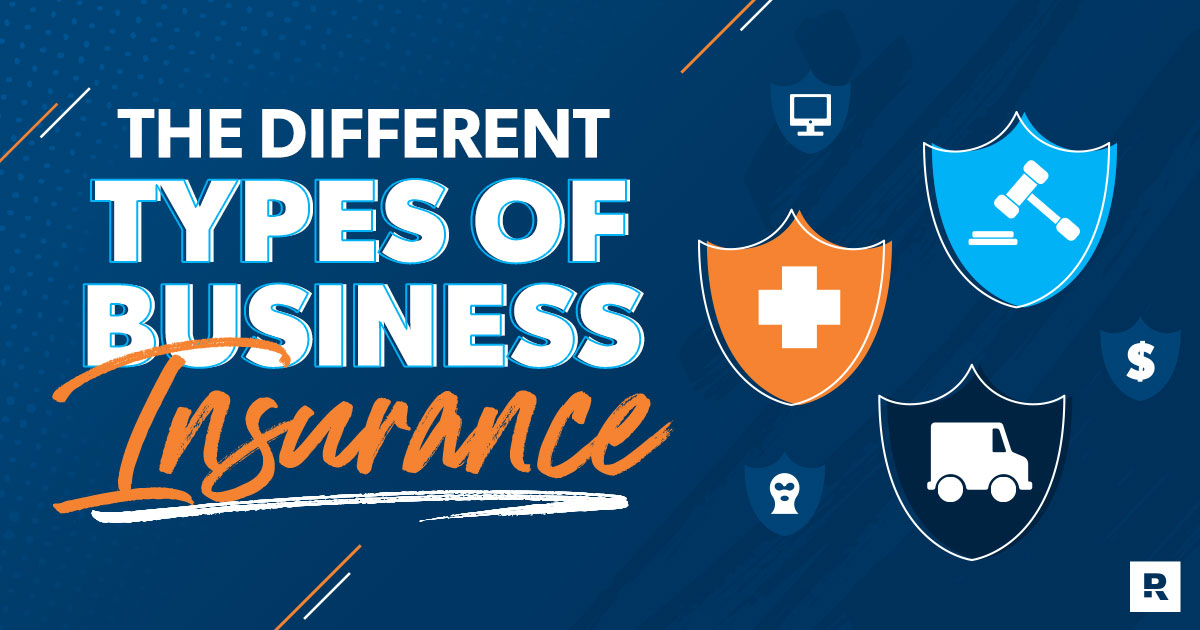
Key Takeaways
- Business insurance can protect you from financial loss caused by things like lawsuits, injuries, property damage or cyberattacks.
- Some key company insurance types include general liability, workers’ compensation, professional liability, health insurance and business property.
- A business owners policy (BOP) bundles common coverages and is a smart, cost-effective option for small businesses.
- Specialized coverage like cyber liability, commercial auto and business income insurance can fill in the gaps.
- Most states require workers’ compensation insurance, and larger businesses must provide health coverage.
Like people, businesses are unique. Unique needs. Unique industry risks. Unique revenue streams. Unique everything!
That’s why there is no one-size-fits-all business insurance package. There are a ton of different types of business insurance coverages you can mix and match.
We’ll go over what’s out there so you can get the protection you need.
Types of Business Insurance
Whether you’re selling Stanley cup knock-offs out of your garage or building apartments in Atlanta, business insurance (also called commercial insurance) is one of the best defensive strategies to protect your company.
It covers things like theft, on-the-job injuries, vehicles, medical costs, expensive lawsuits, cyberattacks and other events that could put you out of business. Some coverages pay you directly for covered events, while others pay the people you owe for claims that are filed.
Here’s a breakdown of 12 types of business insurance you can get.
1. Business Owners Policy (BOP)
A business owners policy (BOP) is a great place to start if you own a small business. It’s a bundled policy that usually includes at least general liability and property insurance. It’s also a great way to save!
2. General Liability
General liability is like the superhero of all business insurance coverage. It covers things like:
- Property damage
- Legal costs
- Medical expenses
- Bodily injury
So if a customer slips on the ice in front of your building, breaks their foot and sues, general liability swoops in and covers legal and medical costs. It can also cover space you rent for your company and help if you’re found responsible for damage to your landlord’s property.
If you own a business, you need general liability. Bottom line.
But just like Superman, it does have some Kryptonite weaknesses. It won’t cover employees who get hurt at work, cases of poor workmanship, professional mistakes and car-related accidents.
3. Workers’ Compensation
Most people have heard of workers’ compensation (or workers’ comp). It protects your company and employees when there are on-the-job injuries. Like if someone slips on a monkey wrench left lying around and breaks their ankle (c’mon, people!). Most states require you to have workers’ compensation coverage—even if you just have a few employees. It covers:
- Medical bills for the injured worker
- Lawsuits against you or the company
- Lost wages if someone misses work
- Physical therapy
- Funeral costs for worst-case scenarios
Without workers’ comp, you’d probably have to pay for these costs out of your own pocket. Not good.
4. Health Insurance
Health insurance is another type of business insurance you can add to cover your employees’ health expenses, and it’s required if you have more than 50 team members. It’s also a great way to attract and keep employees. There’s even a small-business health care tax credit you might be able to take advantage of.
5. Business Personal Property (BPP) Insurance
Business personal property insurance (also called business contents insurance) protects stuff like your inventory, tools, office supplies, computers, heavy machinery, furniture and other equipment. It also covers buildings you own or rent. So if a fire breaks out and you lose a warehouse full of inventory, you won’t be devastated. But it won’t help with floods or earthquakes. You’ll need separate flood and earthquake insurance for those.
And a sidenote: If you run your business from your home, don’t assume your stuff is covered under your homeowners insurance policy. It’s usually not.
Get the right coverage to protect your business.
When a RamseyTrusted pro is in your corner, you’ll have peace of mind knowing your business is protected with the right insurance.
6. Professional Liability Insurance
Professional liability business insurance (also called errors and omissions insurance) covers you if you’re in the professional-service industry (think consulting or accounting). If someone sues you or files a claim for negligent work, you won’t be stuck paying legal fees on your own.
7. Self-Employed Insurance
If you’re self-employed, you’ve likely poured a lot of time, energy and money into building your business—so make sure to protect it. The main types to look into are general liability, professional liability, a business owners policy and workers’ compensation. You’ll also need to cover your own health insurance—luckily, tax deductions on your premiums can help soften the blow.
8. Business Auto Insurance
If you use vehicles for your business, you’ll need business (or commercial) auto insurance. Even with the right amount of coverage on your personal car, your personal policy won’t cover business use. You can also get commercial fleet coverage. So if those donut trucks break down—while you might be “forced” to eat all those donuts yourself (to prevent spoiling, you know)—at least you can get the trucks back on the road soon.
9. Cyber Liability Insurance
Digital threats are a big deal these days. And with cyber liability insurance, you’ll have some coverage in this new wild west of digital bad guys. It takes care of costs related to data hacks and leaked customer data. If you’re running your business on cloud storage or servers, check out cyber liability.
10. Excess Liability
Worried about a claim or lawsuit going above the limits of a policy? That’s where excess liability coverage comes in. It’s an additional layer of coverage you can add to existing policies that raises the limit on how much your insurer will cover for damages you or your employees are responsible for. It’s also sometimes added to an umbrella insurance policy.
11. Crime Insurance
Does someone keep stealing those colorful yard gnomes you’re making? Crime insurance protects your business against things like theft, forgery and fraud. It doesn’t matter if it’s done by employees or nonemployees.
12. Business Income Insurance
Business income (also called business interruption) insurance covers lost revenue if your business is down. Like if a freak tornado destroys your main warehouse and you lose income for a couple months while you rebuild your inventory.
Free Guide: 6 Essentials Your Business Needs for Success
What Types of Business Insurance Are Required?
Most states require you to have workers’ compensation. And if you have over 50 employees, you’re required to provide some kind of health insurance. In some states, accountants need professional liability insurance and doctors are required to have malpractice insurance.
Research your state’s laws and work with an independent insurance agent who can steer you in the right direction.
How to Get Business Insurance
Getting business insurance isn’t something to put off. Trouble has a way of showing up when you least expect it, and the right amount of coverage could be what keeps that “open” sign lit in your front window instead of shutting your business down.
But don’t stress about all the options. Here are five simple steps to help you get the coverage you need.
- Assess your risk. Think about the kinds of problems your business could face (like lawsuits, accidents or property damage).
- Explore your coverage options. Look into general liability, workers’ comp, health insurance and more.
- Get multiple quotes. Shop around with different insurers to see what’s out there.
- Compare policies. Don’t just look at price—check what’s covered and what’s not.
- Choose a policy and sign up. Pick the one that fits your business best and get it in place.
Get Covered Today!
Just a little work on the front end can go a long way in making sure your business is covered. But here’s the deal: When it comes to your business, you can’t afford to hope you have the right protection. You need to know. That’s why we recommend working with one of our RamseyTrustedâ independent insurance agents. They look at your business and industry and put together a customized plan that covers you.
Next Steps
- Identify your risks and coverage needs based on your business type, size and industry.
- Compare quotes from multiple providers to see your options and spot any coverage gaps.
- Connect with a RamseyTrusted pro to build a custom plan that protects your business from the unexpected.



